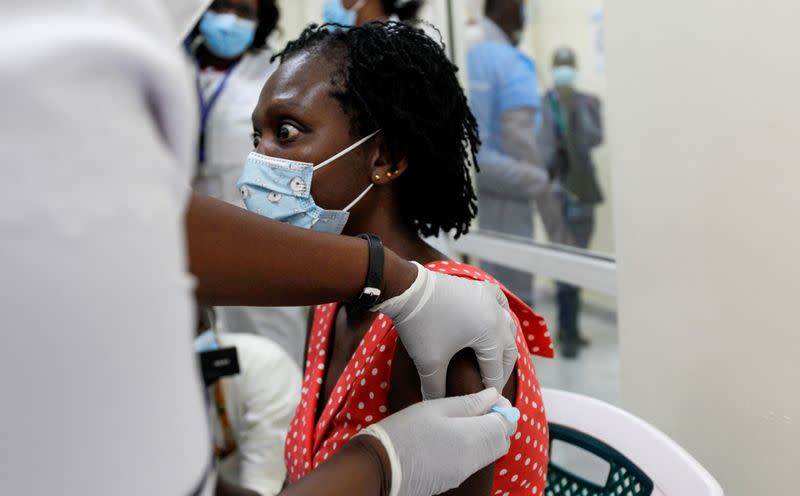By David Lewis and Maggie Fick
NAIROBI (Reuters) – Kenya offered free COVID-19 vaccines to all diplomats based there, including thousands of United Nations officials, although it has not completed vaccinations for its own health workers, other frontline workers or the elderly, attracting criticism from local doctors.
The offer was made in a March 18 letter sent by the Ministry of Foreign Affairs to diplomatic missions and seen by Reuters. Macharia Kamau, the chief secretary of the Ministry of Foreign Affairs, said the vaccines offered were provided by the World Health Organization (WHO) COVAX vaccine access scheme.
Kenya, where nearly 2,000 people died of COVID-19, is battling a third wave and the health ministry reported 28 deaths on Friday, the highest daily figure since the pandemic began.
“We need to protect all Kenyan residents. It made sense not only to reach Kenyans, but also the international community here,” said Kamau
Kamau said Kenyans in priority categories are still being vaccinated, but the decision is in line with Kenya’s responsibilities as home to a large diplomatic community.
He estimated that 25,000 to 30,000 diplomats, UN officials and family members live in Nairobi. “We are the only headquarters of the United Nations capital in the global South. Once you have that kind of honor, it comes with a certain responsibility.”
Nairobi hosts the UN headquarters in Africa. The UN Office in Nairobi (UNON) is one of the top four locations worldwide, where many UN agencies, such as the UNICEF children’s agency and others, have a large presence.
Just over 28,000 health professionals, teachers and security personnel received their first shots, the Ministry of Health said in a March 19 post on Twitter. She said in early March that she would reserve 400,000 vaccines for health care workers and other essential professionals.
“I think the government should focus on vaccinating the priority population and getting acceptance of the vaccine with them before opening up to diplomats,” said Elizabeth Gitau, a Kenyan doctor and executive director of the Kenya Medical Association (KMA).
The Ministry of Health referred the issues to the Ministry of Foreign Affairs. Two Nairobi diplomats who declined to be identified confirmed that their embassies had received the offer.
“Kenyans should be given priority,” said Chibanzi Mwachonda, head of Kenya’s Doctors, Pharmacists and Dentists Union.
The government note said vaccinations would begin on March 23 and only accredited diplomats and their families were eligible.
So far, Kenya has received only two batches of AstraZeneca COVID-19 vaccines – just over 1 million via COVAX and a donation of 100,000 vaccines from the Indian government.
COVAX was created to ensure that vaccines were available to high-risk and vulnerable people, as well as frontline healthcare professionals, in countries that were unable to purchase vaccines in the highly competitive international market.
WHO referred Reuters to UNON and the Kenyan government when asked to comment.
Newton Kanhema, a spokesman for UNON, confirmed that he had received the offer and would accept the government. He said that UNON had approximately 20,000 employees and dependents, but many were children and therefore were not eligible.
“Why does the Kenyan government prioritize expatriates – who have money and can get vaccines through their own channels – over their own population, especially the poor?” Said one of the diplomats whose embassy had received the vaccine offer.
(This story has been redone to correct a typo in the name of the UNON spokesperson in paragraph 16)
(Reporting by David Lewis and Maggie Fick. Mark Potter edition)
